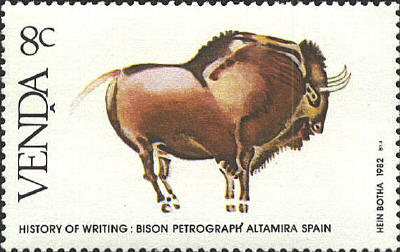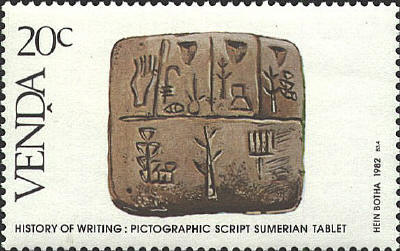|
The purpose of writing is
to convey information and ideas. One method for doing that is the use
of pictures which convey the information or ideas desired. For
example, this sign,
 ,
clearly conveys the notion of gender differentiated bathrooms for us. ,
clearly conveys the notion of gender differentiated bathrooms for us.
Similarly pictographs and petroglyphs did the same for
early generations of human beings. Petroglyphs are images that have
been carved into the rock surface while pictographs have been painted
or drawn on the rock using pigments or dyes.
The picture from eastern California is a petroglyph,
incised or carved into the rock surface. It is perhaps 7000 years old.
It shows several antlered animals.

An example of a pictograph
is the bison from Altamira, Spain. These images date 10,000 to 20,000
years ago. They were painted on the walls of caves. The images at
Altamira focus on bison, which was an important source of food and raw
materials for clothing and tools.

Images like these convey
information, but they also may have other qualities. They may be
expressions of “sympathetic magic” where the image seeks to determine
a specific result, the success of the hunt, or seeks protection from
danger.
In the case of the Bushman
burial stone, the figures and activities may indicate an anticipation
of life after death, or activities of the person during their life.

The stamp showing
“Pictographic Script Sumerian Tablet” shows an accounting tablet, possibly from
Umma, 2900-2600 b.c. (David Diringer, The Alphabet: A Key to the
History of Mankind, 3rd edition. New York: Funk & Wagnalls, 1968,
Vol. 2, p. 20).


 |
